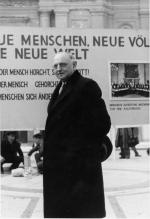The cavalcade rolled on and The Good Road was played to over-full houses in Stuttgart, Frankfurt, Düsseldorf and Essen. Twenty thousand Germans got in to see it, and many more talked with the travellers outside the theatre and in the streets. Many meetings took place, including one where 'we addressed 1,500 men who ran the entire coal industry here'.1 In each place the German and Allied authorities worked together to over-come the tremendous difficulties of receiving so large a body of people, and the London News Chronicle quoted a Military Government official as saying, 'You (Moral Re-Armament) have done more in two days to interpret democracy to the German people than we have been able to do in three years.'2
When, on 26 October, the time came for The Good Roadto move on to The Hague, the Minister-President of North-Rhine Westphalia, Karl Arnold, and his Ministers, Heinrich Lübke, August Halbfell and Walter Menzel, pleaded with Buchman to continue a major action in the Ruhr, where eighty per cent of German heavy industry was then located. 'On every lip', said Halbfell, the Minister of Labour, 'is the question whether the ideas of Washington or Moscow will dominate this region.' A Cominform document, Protocol M, issued in January, had stated, 'The centres of mass-struggle in Germany will be (i) the Ruhr and its industrial capacity, and (ii) the means of transport in West and North Germany.' 'The coming winter', it added, 'will be the decisive period in the history of the German working class.'3*

(* James Byrnes, the US Secretary of State, described how he had had a few drinks late one night with Molotov during the Potsdam conference. After the third highball, he asked Molotov, 'I would like to know what you would really like in Europe.' Molotov's reply was that he would be ready to give up almost anything to obtain Russian representation on the Control Council for the Ruhr. (Forrestal Diaries, p. 347.)
Halbfell did not want the Russian or the American ideas to become dominant. He had begun to see a third way: 'Moral Re-Armament', he said, 'is our one big hope.'4
Buchman was ready. The Forgotten Factor, at Halbfell's request, had been translated into German at Caux. A cast had rehearsed under the direction of Phyllis Austin. Her French relatives had been murdered in Nazi gas chambers, and when she was asked to direct the play she 'felt physically sick'. But she decided to do it, and wrote later that in the doing of it 'a deep love of Germany was born in me'.5 Buchman was prepared to leave this production and a team of fifty behind him in the Ruhr while he went on to The Hague.
358
Photo: In 1948 Buchman, aided by the Allied authorities, took a mobile force into Germany, with plays, photo displays and literature, to present an ideology for democracy.
©Arthur Strong/MRA Productions